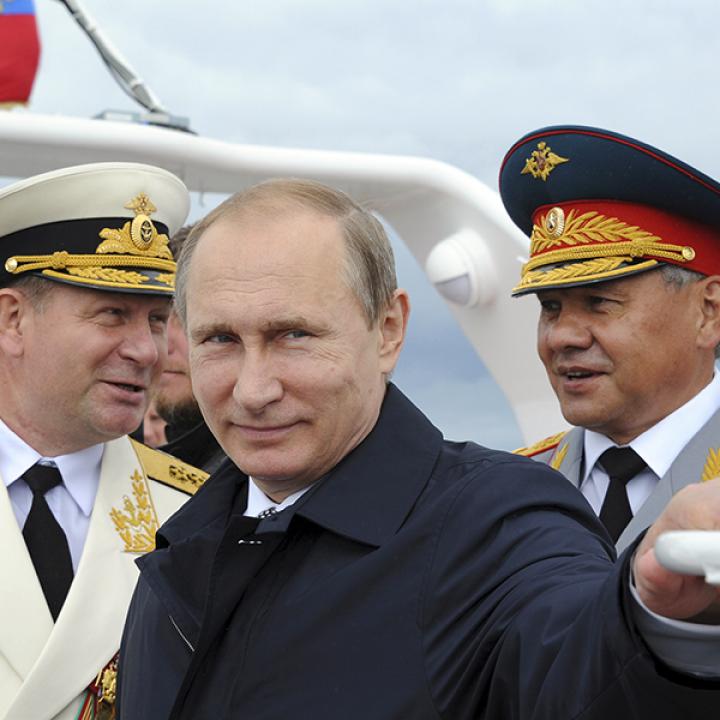
- Policy Analysis
- Articles & Op-Eds
Why Latest Syria Ceasefire Is Exactly What Putin Wanted

As long as Putin keeps control of the narrative in Syria, he can forestall a resolution that compromises Russian interests.
For Moscow, the July 7 meeting between President Trump and Russian President Vladimir Putin in Hamburg was another opportunity to score public relations points. And Putin did just that. In the U.S. press, much ado was made about the post-meeting spins about the exchange on Russian election meddling. But while this issue is very important, Putin's real accomplishment was the announcement upon the meeting's conclusion of a U.S., Russian, and Jordanian ceasefire agreement in southwest Syria.
The ceasefire was the only tangible result of the Trump-Putin meeting, and it was exactly what Putin wanted: to showcase U.S.-Russian cooperation in Syria. The appearance of working with the U.S. helps Putin because it allows him to project Russia's image as a great power, and thus distract the Russian public and help secure his regime's survival.
Speaking at a press conference the day after the meeting, Putin characterized the ceasefire agreement as a breakthrough. In his view, the U.S. position in Syria became "more pragmatic," and while it seemingly didn't change, "there is an understanding that by joining efforts we can achieve a lot. And the result is yesterday's [Syria ceasefire] agreement."
Iran, for its part, welcomed the deal, according to Russian press reports. Iran's Foreign Ministry spokesman said the ceasefire would be "more useful" if it could apply to the rest of Syria and noted that Iranian diplomats communicate regularly with Moscow.
Moscow's track record during the previous four failed ceasefire agreements in Syria provides little grounds for optimism. In the past, Moscow used them as an opportunity to push its own Syria narrative. For instance, Moscow would highlight the U.S. unwillingness to work together, that Russia wouldn't hesitate to use force against groups "masking" as moderate opposition, or that it was U.S.-backed groups that were violating the ceasefire. Moscow would also indirectly highlight its support for Assad by noting that he reserves the right to respond to violations. Once, Russian Minister Sergei Lavrov noted that "no one" could give a 100% guarantee of a ceasefire in Syria. And the breakdown of each ceasefire went seemingly unnoticed in the Kremlin-controlled press.
Currently, Putin does have reason to ensure the latest ceasefire will hold, at least temporarily. It would allow him to improve relations with Trump (something he wants and needs) and reduce tensions on the Syrian-Israeli border. This would also allow Putin to continue to balance good relations with both Israel and Iran. Perhaps more importantly, closer cooperation with Washington might dissuade the U.S. from its attacks on Assad regime and Iranian forces.
Certainly, Putin could stop providing air cover to Iranian militias in Syria as they increasingly push into southeast Syria -- if he wanted to do so. That would be a good start. Yet it is doubtful, even if he did, whether Putin could change Iran's overall policy goals in Syria -- nor does he have any incentive to do so. In addition, it is simply hard to enforce a ceasefire from the air.
A true resolution to the Syrian tragedy is not in Putin's interest because it would no longer justify Russia's presence there. It is ironic that a senior State Department official used the word "freeze" when he described the hope the U.S. has for the current ceasefire agreement. "[I]t's essentially an undertaking to use our influence, the Jordanians their influence, the Russians to use their influence with all of the sides of the conflict to stop the fighting, to essentially freeze the conflict," said the official.
The Kremlin knows exactly how to freeze conflicts. As long as Putin continues to control the narrative in Syria, even if the current ceasefire holds, it is doubtful that it will lead to a real resolution in Syria. Which, sadly, appears to be exactly what Putin wants.
Anna Borshchevskaya is the Ira Weiner Fellow at The Washington Institute.
Forbes



